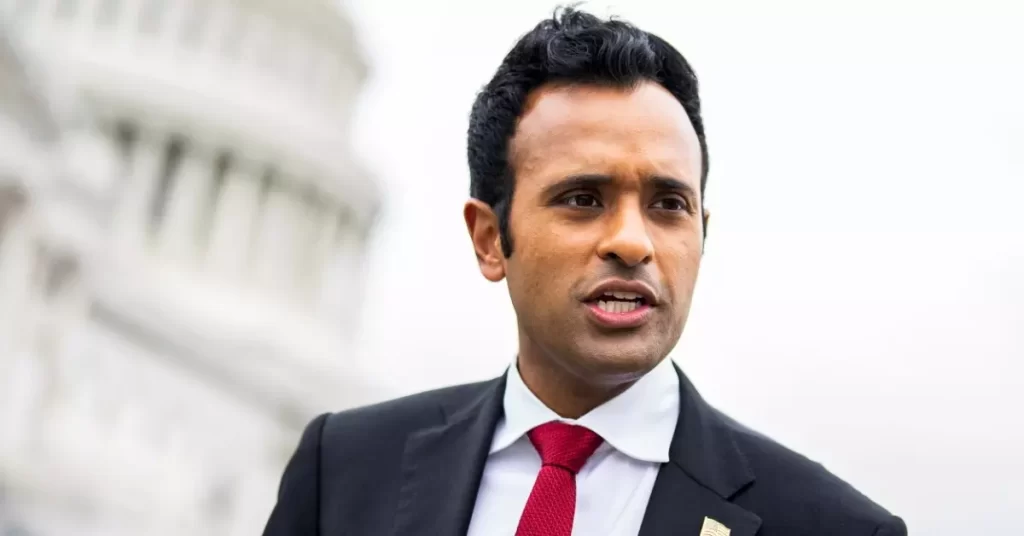Vivek Ramaswamy Join Tiktok To Impact Young Voters Of The United States Of America
In a surprising move, presidential candidate Vivek Ramaswamy has embraced TikTok, citing influence from Jake Paul and aiming to connect with young voters. As age takes center stage in the 2024 election, Ramaswamy, at 38, stands as the youngest contender. This strategic youth appeal, however, sparks both support and concerns within the GOP. While some applaud his relatability, others caution against his limited political experience. Amid growing success in polls, Ramaswamy faces the challenge of balancing his millennial image with the demands of a seasoned political landscape. The road to winning over the next generation proves complex, with dynamics shifting between age, experience, and modern outreach strategies.
Presidential hopeful Vivek Ramaswamy’s unexpected foray into TikTok has ignited a debate about the role of social media in politics and the delicate balance between youthful appeal and political acumen. In his debut video, Ramaswamy boldly declared, “I’m on TikTok now,” attributing his decision to the influence of social media personality Jake Paul. The move is part of a broader campaign strategy to engage and energize young voters, a demographic often underserved in traditional political outreach.
Youth Appeal and Age Concerns
At 38, Ramaswamy is the youngest candidate in the 2024 presidential race, leveraging his age as an asset to resonate with younger voters. The ongoing discourse about the ages of current and former presidents, notably Joe Biden and Donald Trump, both in their 70s, has intensified the focus on the generational shift in American politics.
Ramaswamy’s youth-centric approach has garnered attention, especially among Republicans in their twenties and thirties who express concerns about the aging presidential candidates. Lauren Langas, vice chairwoman of the Texas Young Republicans, acknowledges the apprehension within younger demographics regarding the stamina and adaptability of older candidates. Rafael Struve, communications director for the Texas Young Republicans, notes that Ramaswamy’s millennial status provides a relatable factor for younger voters, a sentiment echoed by others who appreciate the candidate’s effort to bridge the generational gap.
However, not all young voters are convinced. Despite Ramaswamy’s rise to third place among GOP candidates in national polls, a YouGov survey indicates that only 5% of voters aged 18 to 29 would vote for him. Concerns about his lack of political experience and untested performance on the political stage contribute to reservations among this demographic.
Navigating the Age-Experience Dilemma
Ramaswamy’s success in the polls reflects a cautious acceptance among young Republicans. While his millennial appeal resonates, questions linger about his ability to navigate complex political discussions and lead the nation effectively. In a political landscape where experience often plays a crucial role, some argue that Ramaswamy’s campaign must address these concerns to secure broader support.
The candidate’s call to raise the legal voting age from 18 to 25, contingent on meeting certain criteria, adds another layer to the age-related discussions. This proposal underscores Ramaswamy’s unconventional approach to political issues, positioning himself as a disruptor of traditional norms.
TikTok as a Political Platform
Ramaswamy’s move to TikTok, a platform predominantly associated with entertainment and trends, highlights the evolving nature of political outreach. In his second video, Ramaswamy acknowledges the reluctance of professional politicians to engage in unscripted conversations on social media. Embracing his background as a biotech entrepreneur and investor, he positions himself as a non-traditional candidate unafraid of candid interactions.
The TikTok platform provides Ramaswamy with a direct channel to connect with younger voters, who often feel overlooked in mainstream political discourse. His intentional efforts to appeal to Generation Z and millennial voters include unconventional actions, such as rapping along to Eminem’s “Lose Yourself” at the Iowa State Fair. While these tactics may not resonate with everyone, they signal a willingness to break away from traditional campaign strategies and engage with audiences on a more personal level.
Challenges and Competition
Despite Ramaswamy’s strides in marketing himself to younger generations, significant challenges lie ahead. The political landscape remains dominated by figures like Donald Trump, who, despite being almost 80, maintains substantial support within the Republican Party. The Real Clear Politics average of Republican primary polls places Trump at 56.1% support, overshadowing Ramaswamy’s 6.6%.
Furthermore, the emergence of Florida Governor Ron DeSantis, at 45 with over a decade of political experience, poses a formidable challenge to Ramaswamy’s youth-centric approach. DeSantis represents a middle ground option for young voters, combining a relatively younger age with substantial political know-how. Some argue that DeSantis’s track record and ability to address both the concerns of younger voters and job training needs make him a strong contender.
Navigating the Crossroads of Age and Ambition
As Vivek Ramaswamy charts a unique course in the 2024 presidential race, his embrace of TikTok and focus on youth outreach prompt a critical examination of the evolving dynamics in American politics. The delicate balance between age, experience, and unconventional campaign strategies adds layers to the narrative. Whether Ramaswamy’s gamble on TikTok will pay off in winning the hearts and votes of the younger generation remains uncertain. In a political landscape characterized by contrasts between tradition and innovation, the intersection of age and ambition defines the challenge and opportunity for candidates seeking to redefine the future of American leadership.



